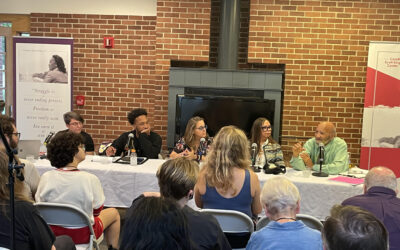 Teófilo Espada-Brignoni, visiting assistant professor of psychology, presents his research at four major conferences.
Teófilo Espada-Brignoni, visiting assistant professor of psychology, presents his research at four major conferences.
In February, he presented “Imperial diet: The American palate and Puerto Rican agriculture” at the Wilson College Humanities Conference: Consumption, Food, Culture, Desire in Chambersburg, PA.
In March, he presented “Ambivalent morals: Debates on human morality in evolutionary theory” at the 111th Annual Conference of the Southern Society for Philosophy and Psychology in Cincinnati. That month, he also presented “Narrating the jazz life: Music through autobiography” at Storytelling: Sociological methods, motives and mantras, a conference of the Northcentral Sociological Association.
In early April, he will attend the Cincinnati Conference on Romance & Arabic Languages & Literatures, where he and Ashley Rosa-Jiménez will present “Medicine, anthropology, psychology, and compassion in XIX-century Puerto Rico: The case of Isidora Gual.”
Professor Espada-Brignoni’s Research
Imperial Diet: The American Palate and Puerto Rican Agriculture
Consumption, Food, Culture, Desire
Wilson College Humanities Conference: Consumption, Food, Culture, Desire
Chambersburg, PA
February 2019
One of the features of imperialism is the representation of the other as an object of desire and control. After the Spanish-American War, several writers sought to represent Puerto Rico to North American officials and the general public as a fertile ground for U.S. enterprises. Likewise, they argued that the colonial relationship would benefit Puerto Rico by imposing scientific and rational leadership. Fantasies of leisure and consumption were realized and promoted by writers praising the varieties and qualities of Puerto Rican crops and scientists who analyzed the capabilities of Puerto Rico for growing fruits that would satisfy the American palate. The evaluation of the Island regarding the fantasies of desire it could satisfy, by scientists, officials, and travel writers came at the expense of invisibilizing the tastes and need of the locals. In this paper, I analyze both official reports and popular accounts of Puerto Rico during the first decade after the Spanish American War. These texts construct the island as an object with the potentials to satisfy the exotic desires of tourists escaping the cold weather and looking for adventure, and the domestic needs of the United States while supposedly helping the locals improve their life. Puerto Ricans on the other hand are constructed as weak and docile subjects who could benefit significantly from the surplus America produces.
Ambivalent morals: Debates on human morality in evolutionary theory.
111th Annual Conference of the Southern Society for Philosophy and Psychology
Cincinnati, OH
March 2019
Of scholars who write on the history of science and psychology, one of Darwin’s main contributions was the dethroning of morality as an object deserving of scientific and philosophical attention. This idea stems from the writer’s sensitivities and desires of a world that regards religious orthodoxy and conventional forms of morality as obsolete. In this paper, the author uses discourse analysis to analyze, from a socio-psychological-historical perspective, how evolutionists such as Charles Darwin and William Lauder Lindsay framed morality as an object of natural history. Furthermore, some psychologists, among them B.F. Skinner and John Watson, call themselves Darwinists as a way of defending their work from those who criticize the stubbornest versions of positivism. Consequently, they imply that Darwinism rejects the analysis of internal states and other issues such as morality.
While Darwin and Lindsay disagreed on whether animals and humans share a sense of morality, their views and specific positions stem from the naturalistic discourse. According to Darwin humans are the only animal that possesses a sense of morality. Lindsay disagrees arguing that human and non-human animals have moral capabilities. The difference between Darwin and Lindsay is the specific degree to which both display certain mental and social faculties. Lindsay argues that if we were to compare the lowest animal with an extraordinary human being, we would conclude that only humans could be moral. However, if someone compared the best specimen of a non-human animal species with a below-average human being, they might find the animal to be superior. Darwin frames his claims about human morality in a similar manner. For him, the difference between humans and non-human animals relies on the current cognitive and social abilities of the latter and he even considers, that through evolution, animals might develop a moral sense in the future.
Narrating the Jazz Life: Music through Autobiography
Storytelling: Sociological methods, motives and mantras
Northcentral Sociological Association
Cincinnati, OH
March 2019
Groups and individuals engaged in a particular trade develop ways of making sense of themselves that borrow from more general social frames while creating their own rules and points of view. Early jazz was characterized by the emergence of themes and ideas that musicians used to qualify their music, their behaviors, and collective performances. In this paper I use discourse analysis to examine the autobiographies of New Orleans’ musicians such as Sidney Bechet, Baby Dodds, Louis Armstrong, and Pops Foster as an example of how they made sense of their own lives. I use Foucault’s notion of “ethical substance” to explore the main themes these musicians used to frame their narratives and evaluate the lives of other musicians. Some of the themes shared by these autobiographies are: music as a trade, musical knowledge, and creativity. These autobiographies problematize what others write about jazz and assert narrative authority over their music.
Medicine, Anthropology, Psychology and Compassion in XIX-Century Puerto Rico: The Case of Isidora Gual
Teófilo Espada-Brignoni & Ashley Rosa-Jiménez
Cincinnati Conference on Romance & Arabic Languages & Literatures
April 2019
In August 1891, when she was 15 or 16, Isidora strangled her 8-month-old son. While she was not the first woman accused of infanticide (or parricide), her case drew the attention of physicians and reporters, who attempted to understand why she had killed her son. The case of Isidora, unlike the other cases of infanticide, revealed the new and complex set of relations between medicine, anthropology, psychology, and culture in XIX-century Puerto Rico.



